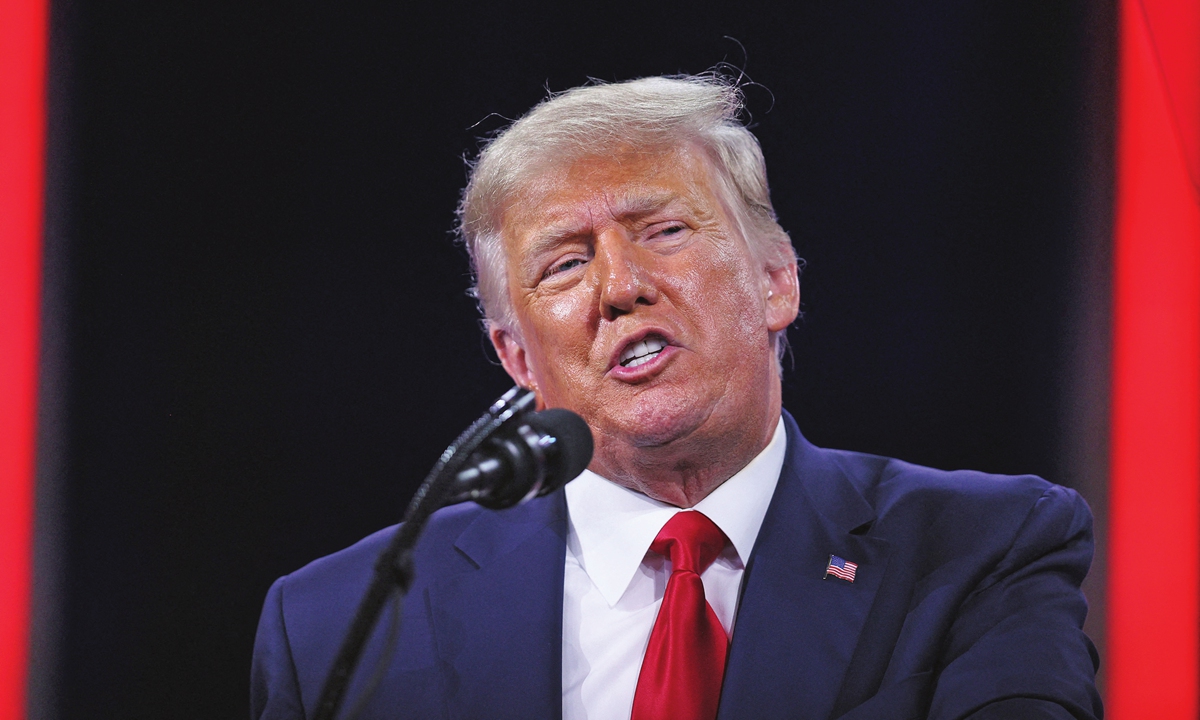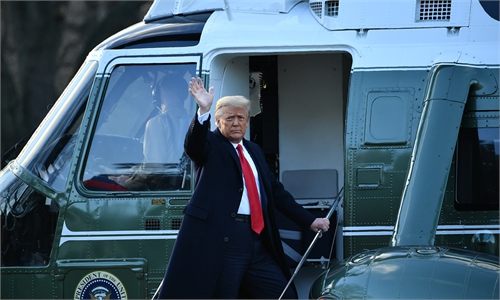The district attorney investigating former US president Donald Trump's alleged interference in Georgia's 2020 election has hired outside counsel who is a national authority on racketeering, a source familiar with the matter told Reuters.
Fulton County District Attorney Fani Willis has enlisted the help of Atlanta lawyer John Floyd, who wrote a national guide on prosecuting state racketeering cases. Floyd was hired recently to "provide help as needed" on matters involving racketeering, including the Trump investigation and other cases, said the source, with direct knowledge of the situation.
The move bolsters the team investigating Trump as Willis prepares to issue subpoenas for evidence on whether the former president and his allies broke the law in their campaign to pressure state officials to reverse his Georgia election loss. Willis has said that her office would examine potential charges including "solicitation of election fraud, making false statements to state and local governmental bodies, conspiracy, and racketeering" among other possible violations. Floyd's appointment signals that racketeering could feature prominently in the investigation. It's an area of law in which Willis has extensive experience - including a high-profile Atlanta case where she won racketeering convictions of 11 public educators for a scheme to cheat on standardized tests.
The investigation of Trump focuses in part on his phone call to Georgia's secretary of state, asking the secretary to "find" the votes needed to overturn his election loss, based on false voter fraud claims.

If she pursues racketeering charges, Willis will need to prove a pattern of corruption by Trump, alone or with his allies, aimed at overturning the election results.
While racketeering is typically pursued by prosecutors in cases involving such crimes as murder, kidnapping, and bribery, the Georgia statute defines racketeering more broadly to include false statements made to state officials.
The federal Racketeer Influenced and Corrupt Organizations Act (RICO) was originally passed in 1970 to help tie Mafia bosses to the crimes of their underlings by allowing prosecutors to argue they conspired together in a "criminal enterprise." Willis specifically listed racketeering and lying to public officials in detailing the possible crimes her office intended to investigate in a February 10 letter to four Republican state officials, asking them to preserve records related to the case.
"It's not a stretch to see where she's taking this," said Cathy Cox, dean of Mercer University's law school in Macon, Georgia, and a former Georgia secretary of state. "If Donald Trump engaged in two or more acts that involve false statements - that were made knowingly and willfully in an attempt to falsify material fact, like the election results - then you can piece together a violation of the racketeering act."
Racketeering, a felony in Georgia, can carry stiff penalties including up to 20 years in prison and a hefty fine. "There are not a lot of people who avoid serving prison time on a racketeering offense," said Cox.
'Find' the votes
In a January 2 phone call, Trump urged Georgia Secretary of State Brad Raffensperger, a fellow Republican, to "find" just enough votes to allow him to win. In the hour-long call, Trump repeated false voter-fraud claims, insisting he won Georgia by a landslide. Trump made another phone call in late December 2020 to Georgia's chief elections investigator, urging the official to "find the fraud."
On December 5, 2020, Trump called the state's Republican governor, Brian Kemp, to urge him to hold a special session of the legislature to overturn the election results. Three days later, Trump called Georgia's Republican attorney general, Chris Carr, warning him not to interfere with a Texas lawsuit that challenged the election results in Georgia and other states, a lawsuit that he publicly opposed.
Willis' office has indicated it is also examining efforts to influence the election by Trump's allies, including a November phone call made by Republican Senator Lindsey Graham to Raffensperger to discuss mail-in ballots; false election fraud claims made by Trump's then-personal attorney, Rudy Giuliani, in testimony at state legislative hearings; and the abrupt removal of Byung J. "BJay" Pak, a US attorney in Georgia who angered Trump by not doing enough to investigate his unfounded fraud claims. Legal experts say prosecutors could use the pattern of false statements in a pressure campaign to build a RICO case, but that Willis would face the burden of proving Trump knew his fraud allegations were false.
"Trump's lawyers could reasonably point to portions of the call with the Secretary of State where Trump seems to be making clear that the reason they need to do something is because there is fraud in the election," said Kurt Kastorf, an Atlanta attorney and former US Justice Department prosecutor. "Prosecutors would need to respond with evidence that this asserted reason is insincere."
Conspiracy to cheat
As an assistant district attorney in Atlanta, Willis employed the state's racketeering statute in the complex test-cheating case - leading to a six-month trial, the longest in Georgia's history.
Willis led a team of prosecutors in laying out the case that educators had operated a criminal enterprise within the public school system in a conspiracy to cheat, winning convictions in April 2015. Willis and her team walked jurors through months of testimony in the intricate case, which accused 12 former teachers, principals, and administrators of inflating scores on standardized tests to secure promotions and cash bonuses. Eleven were convicted; some got prison time.
Anti-racketeering laws are a powerful tool for prosecutors, but building a successful case requires meeting a complex set of legal requirements, according to Floyd, who wrote the book, RICO State by State: A Guide to Litigation Under the State Racketeering Statutes.
Fulton County District Attorney Fani Willis has enlisted the help of Atlanta lawyer John Floyd, who wrote a national guide on prosecuting state racketeering cases. Floyd was hired recently to "provide help as needed" on matters involving racketeering, including the Trump investigation and other cases, said the source, with direct knowledge of the situation.
The move bolsters the team investigating Trump as Willis prepares to issue subpoenas for evidence on whether the former president and his allies broke the law in their campaign to pressure state officials to reverse his Georgia election loss. Willis has said that her office would examine potential charges including "solicitation of election fraud, making false statements to state and local governmental bodies, conspiracy, and racketeering" among other possible violations. Floyd's appointment signals that racketeering could feature prominently in the investigation. It's an area of law in which Willis has extensive experience - including a high-profile Atlanta case where she won racketeering convictions of 11 public educators for a scheme to cheat on standardized tests.
The investigation of Trump focuses in part on his phone call to Georgia's secretary of state, asking the secretary to "find" the votes needed to overturn his election loss, based on false voter fraud claims.

Former US president Donald Trump addresses the Conservative Political Action Conference in the Hyatt Regency, in Orlando, Florida, the US, on February 28. Photo: AFP
Willis - a Democrat who in January became the county's first Black woman district attorney - will have to navigate a fraught political landscape. She faces pressure from Democrats in Atlanta and nationally to pursue an aggressive prosecution, along with scrutiny from Republicans in a state historically dominated by that party.If she pursues racketeering charges, Willis will need to prove a pattern of corruption by Trump, alone or with his allies, aimed at overturning the election results.
While racketeering is typically pursued by prosecutors in cases involving such crimes as murder, kidnapping, and bribery, the Georgia statute defines racketeering more broadly to include false statements made to state officials.
The federal Racketeer Influenced and Corrupt Organizations Act (RICO) was originally passed in 1970 to help tie Mafia bosses to the crimes of their underlings by allowing prosecutors to argue they conspired together in a "criminal enterprise." Willis specifically listed racketeering and lying to public officials in detailing the possible crimes her office intended to investigate in a February 10 letter to four Republican state officials, asking them to preserve records related to the case.
"It's not a stretch to see where she's taking this," said Cathy Cox, dean of Mercer University's law school in Macon, Georgia, and a former Georgia secretary of state. "If Donald Trump engaged in two or more acts that involve false statements - that were made knowingly and willfully in an attempt to falsify material fact, like the election results - then you can piece together a violation of the racketeering act."
Racketeering, a felony in Georgia, can carry stiff penalties including up to 20 years in prison and a hefty fine. "There are not a lot of people who avoid serving prison time on a racketeering offense," said Cox.
'Find' the votes
In a January 2 phone call, Trump urged Georgia Secretary of State Brad Raffensperger, a fellow Republican, to "find" just enough votes to allow him to win. In the hour-long call, Trump repeated false voter-fraud claims, insisting he won Georgia by a landslide. Trump made another phone call in late December 2020 to Georgia's chief elections investigator, urging the official to "find the fraud."
On December 5, 2020, Trump called the state's Republican governor, Brian Kemp, to urge him to hold a special session of the legislature to overturn the election results. Three days later, Trump called Georgia's Republican attorney general, Chris Carr, warning him not to interfere with a Texas lawsuit that challenged the election results in Georgia and other states, a lawsuit that he publicly opposed.
Willis' office has indicated it is also examining efforts to influence the election by Trump's allies, including a November phone call made by Republican Senator Lindsey Graham to Raffensperger to discuss mail-in ballots; false election fraud claims made by Trump's then-personal attorney, Rudy Giuliani, in testimony at state legislative hearings; and the abrupt removal of Byung J. "BJay" Pak, a US attorney in Georgia who angered Trump by not doing enough to investigate his unfounded fraud claims. Legal experts say prosecutors could use the pattern of false statements in a pressure campaign to build a RICO case, but that Willis would face the burden of proving Trump knew his fraud allegations were false.
"Trump's lawyers could reasonably point to portions of the call with the Secretary of State where Trump seems to be making clear that the reason they need to do something is because there is fraud in the election," said Kurt Kastorf, an Atlanta attorney and former US Justice Department prosecutor. "Prosecutors would need to respond with evidence that this asserted reason is insincere."
Conspiracy to cheat
As an assistant district attorney in Atlanta, Willis employed the state's racketeering statute in the complex test-cheating case - leading to a six-month trial, the longest in Georgia's history.
Willis led a team of prosecutors in laying out the case that educators had operated a criminal enterprise within the public school system in a conspiracy to cheat, winning convictions in April 2015. Willis and her team walked jurors through months of testimony in the intricate case, which accused 12 former teachers, principals, and administrators of inflating scores on standardized tests to secure promotions and cash bonuses. Eleven were convicted; some got prison time.
Anti-racketeering laws are a powerful tool for prosecutors, but building a successful case requires meeting a complex set of legal requirements, according to Floyd, who wrote the book, RICO State by State: A Guide to Litigation Under the State Racketeering Statutes.

